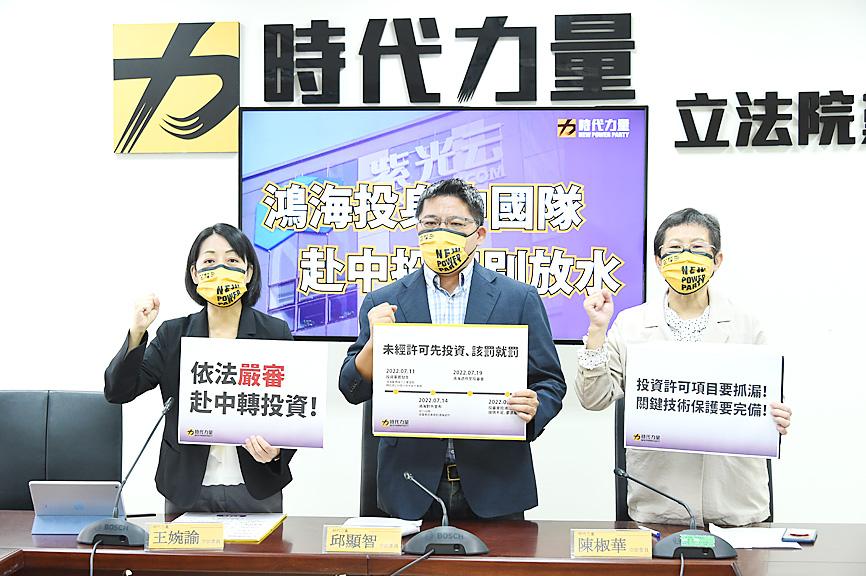The New Power Party (NPP) caucus yesterday called on the Investment Commission to punish businesses that invest in China without permission, after Foxconn Industrial Internet Co Ltd (FII) invested in Chinese chip company Tsinghua Unigroup.
FII, which is 85 percent owned by Hon Hai Precision Industry Co, invested 5.38 billion yuan (US$795.7 million) in the Chinese-backed company earlier this month.
Not only is the deal politically sensitive, Hon Hai also failed to follow the procedure stipulated in the Act Governing Relations Between the People of the Taiwan Area and the Mainland Area (臺灣地區與大陸地區人民關係條例), which requires investments in China in sensitive industries or in excess of US$1 million to be approved in advance, NPP caucus whip Chiu Hsien-chih (邱顯智) told a news conference in Taipei.

Photo: Tu Chien-jung, Taipei Times
Hon Hai made the investment on July 11 and submitted it to the commission for review on July 19, he said.
According to Article 35 of the act, Hon Hai can face a fine of up to NT$25 million (US$835,729) for investing before obtaining approval, he said, adding that the fine can be imposed repeatedly if the company does not resolve the issue.
He questioned whether the fine is too lenient for the company in comparison to its investment and asked the government to reconsider whether the penalties are effective in deterring huge investments made by multinational enterprises.
The commission should consider the impact of the investment on Taiwan’s competitiveness, he said.
Even if approval is granted, the commission should add an incidental provision based on the Administrative Procedure Act (行政程序法) to reserve the right to rescind the approval if an unexpected situation arises, he added.
NPP Legislator Claire Wang (王婉諭) said that Tsinghua plays an important role in China’s semiconductor development and is owned by Beijing Zhiguangxin Holding Co, whose biggest shareholders are financially backed by FII and the Chinese State Council.
The investment can therefore be considered Hon Hai supporting the Chinese semiconductor industry together with Beijing, which might threaten Taiwan’s semiconductor industry in the long term, she said.
NPP Chairwoman Chen Jiau-hua (陳椒華) warned the government against the impact the investment might have and demanded that it review the case strictly.
Industries that involve important semiconductor technologies such as IC design and 12-inch silicon wafer production were listed as “prohibited categories” for investment in China, but were changed to “general categories” by the administration of former president Ma Ying-jeou (馬英九), she said.
Although the National Security Act (國家安全法) was amended in May to protect Taiwan’s “core” technologies, its effectiveness might be limited if the list of prohibited investment items is not updated, she added.

South Korean K-pop girl group Blackpink are to make Kaohsiung the first stop on their Asia tour when they perform at Kaohsiung National Stadium on Oct. 18 and 19, the event organizer said yesterday. The upcoming performances will also make Blackpink the first girl group ever to perform twice at the stadium. It will be the group’s third visit to Taiwan to stage a concert. The last time Blackpink held a concert in the city was in March 2023. Their first concert in Taiwan was on March 3, 2019, at NTSU Arena (Linkou Arena). The group’s 2022-2023 “Born Pink” tour set a

CPBL players, cheerleaders and officials pose at a news conference in Taipei yesterday announcing the upcoming All-Star Game. This year’s CPBL All-Star Weekend is to be held at the Taipei Dome on July 19 and 20.

The Taiwan High Court yesterday upheld a lower court’s decision that ruled in favor of former president Tsai Ing-wen (蔡英文) regarding the legitimacy of her doctoral degree. The issue surrounding Tsai’s academic credentials was raised by former political talk show host Dennis Peng (彭文正) in a Facebook post in June 2019, when Tsai was seeking re-election. Peng has repeatedly accused Tsai of never completing her doctoral dissertation to get a doctoral degree in law from the London School of Economics and Political Science (LSE) in 1984. He subsequently filed a declaratory action charging that

The Hualien Branch of the High Court today sentenced the main suspect in the 2021 fatal derailment of the Taroko Express to 12 years and six months in jail in the second trial of the suspect for his role in Taiwan’s deadliest train crash. Lee Yi-hsiang (李義祥), the driver of a crane truck that fell onto the tracks and which the the Taiwan Railways Administration's (TRA) train crashed into in an accident that killed 49 people and injured 200, was sentenced to seven years and 10 months in the first trial by the Hualien District Court in 2022. Hoa Van Hao, a